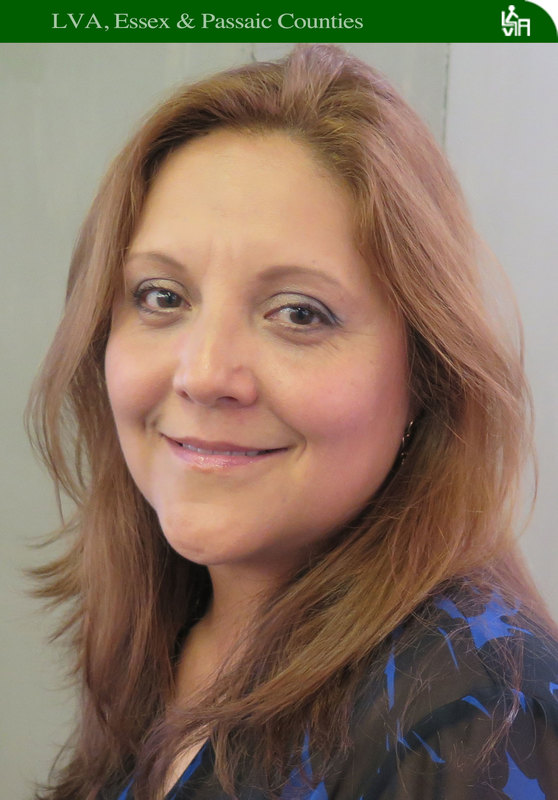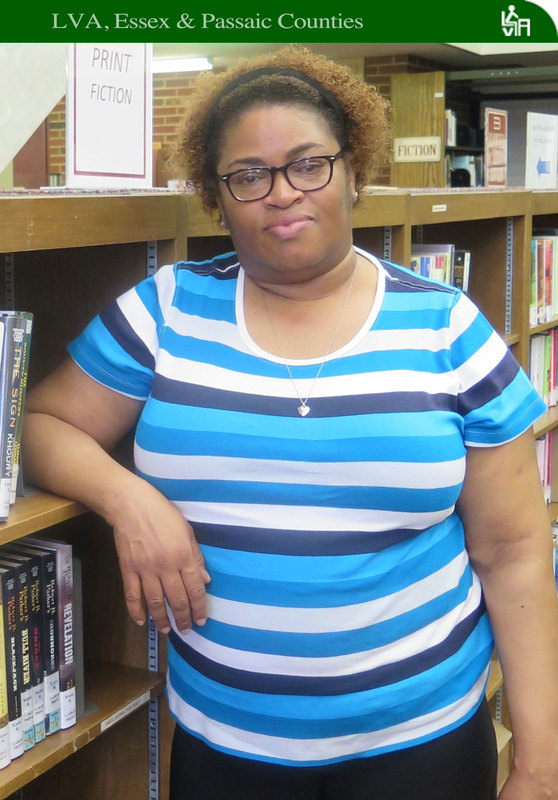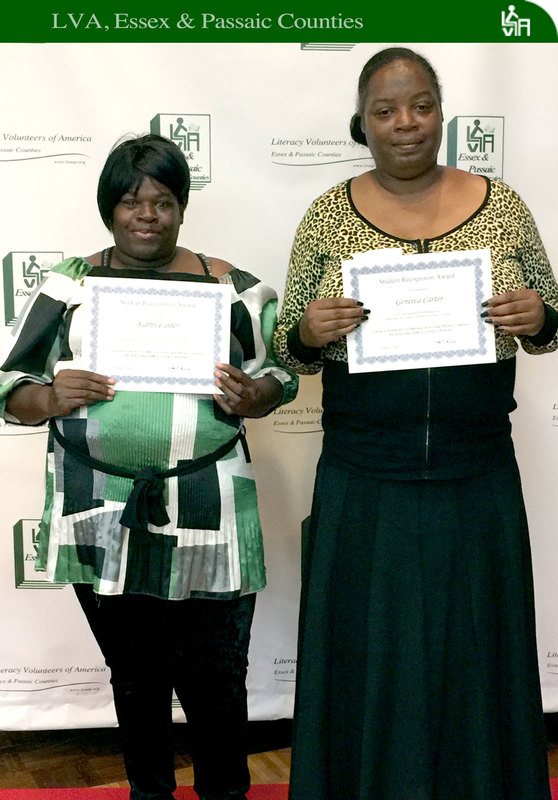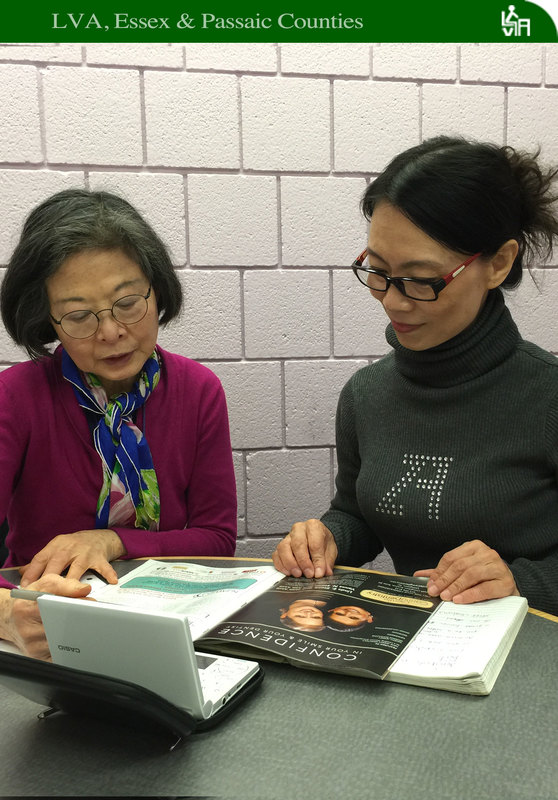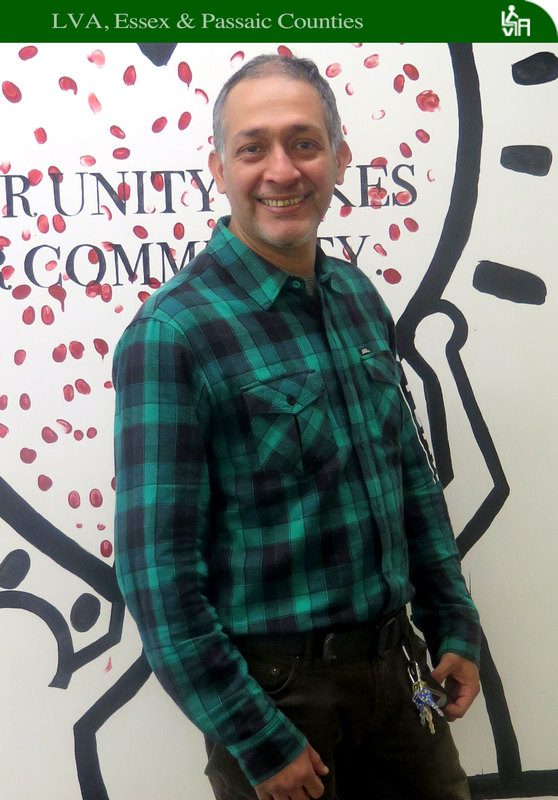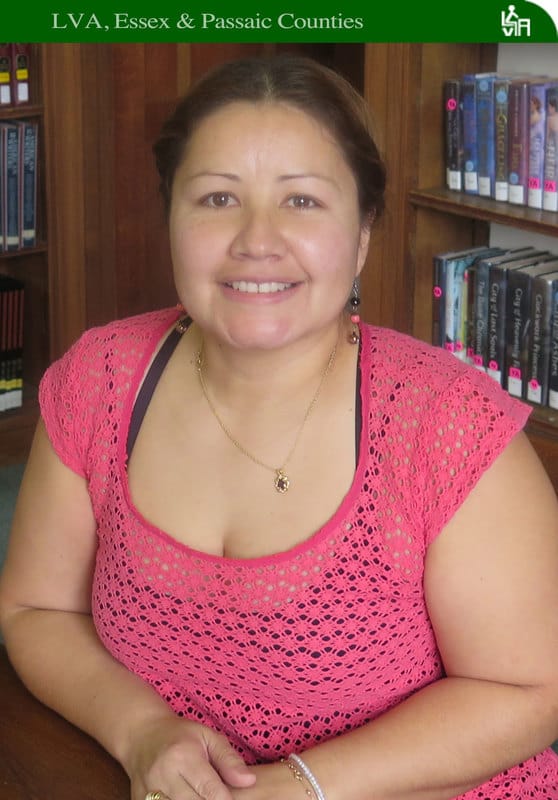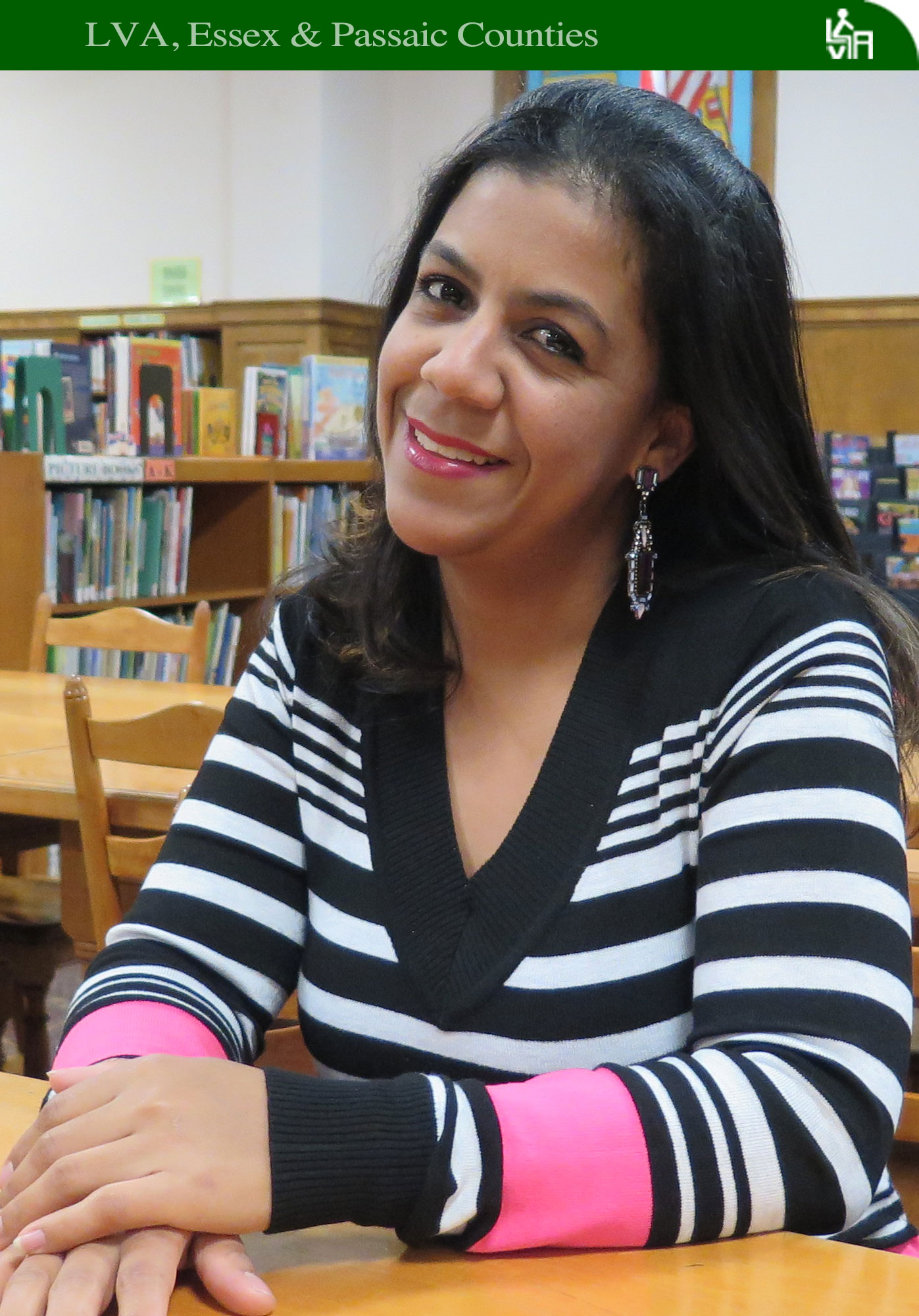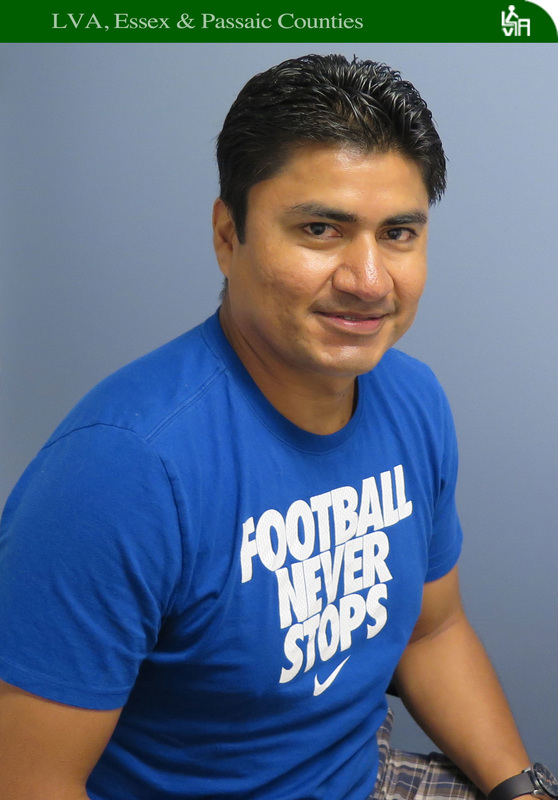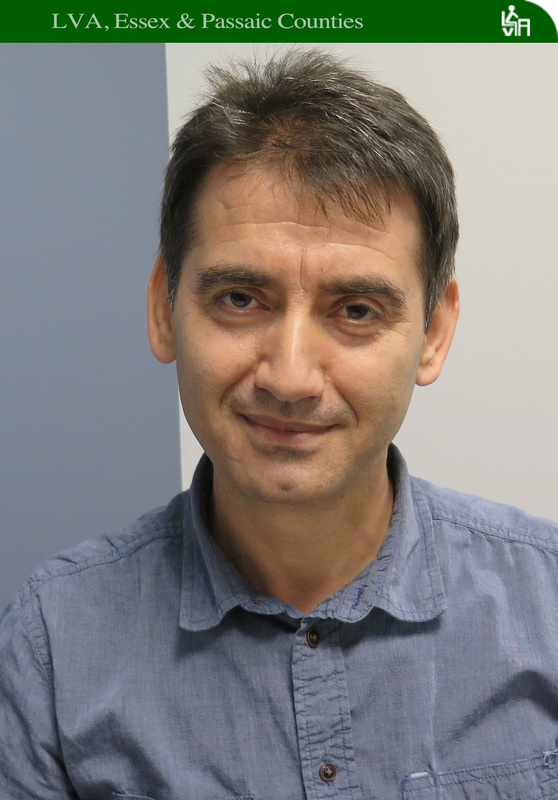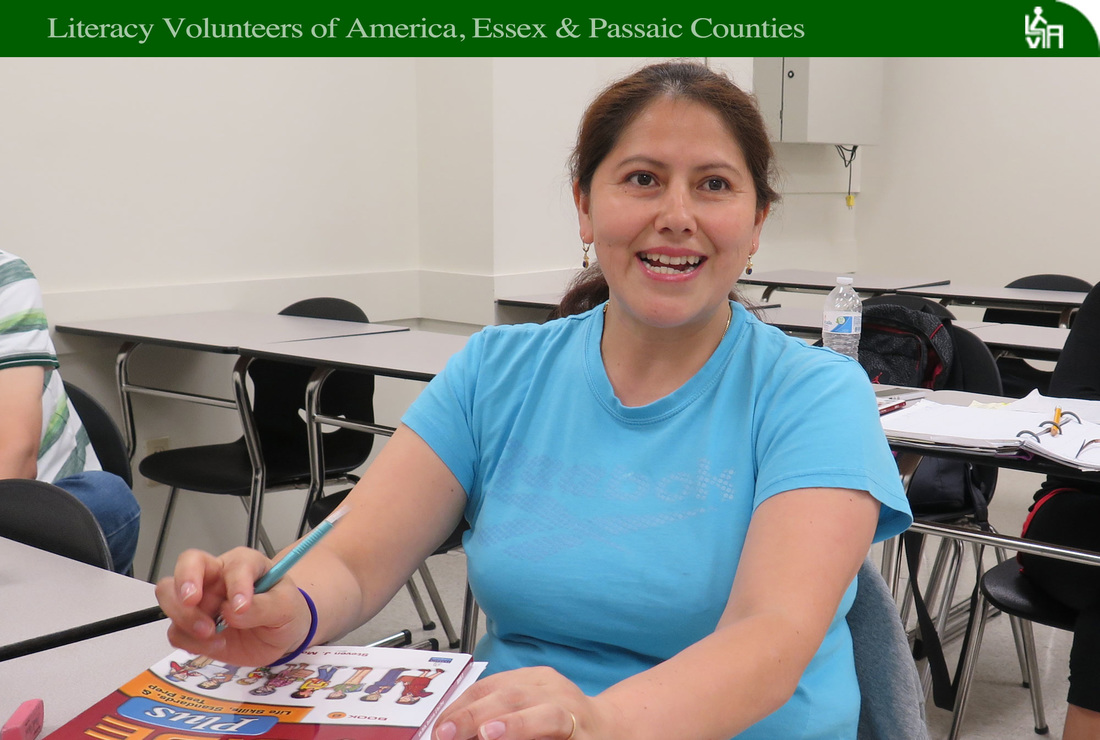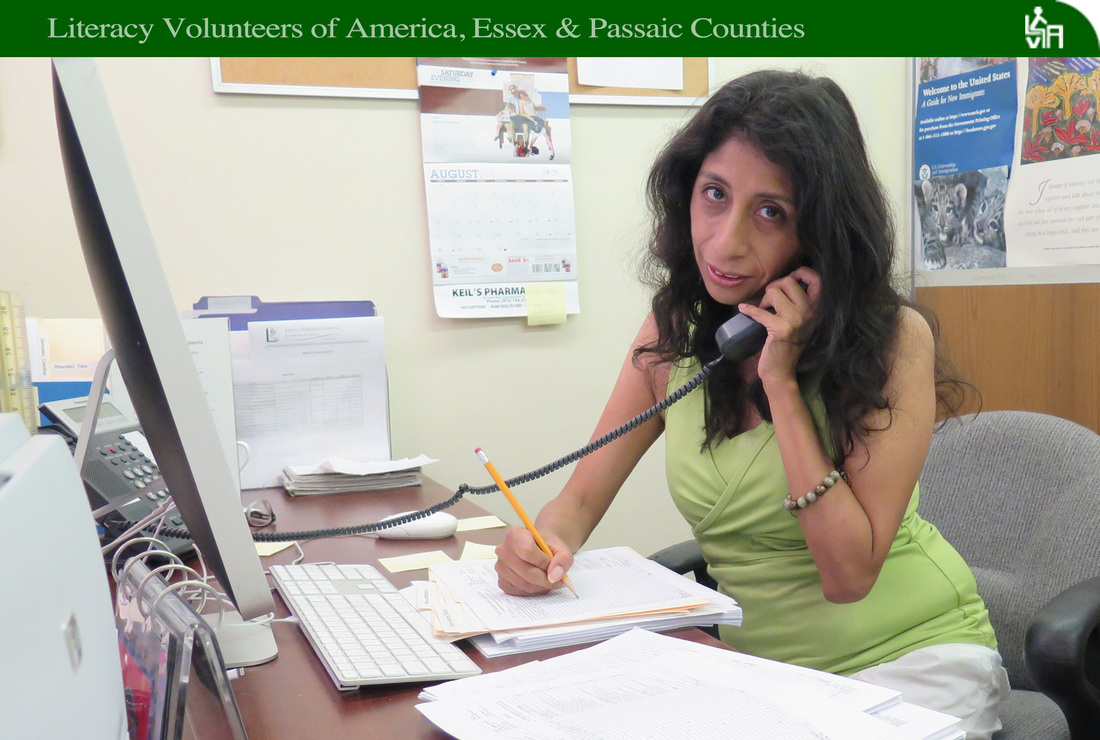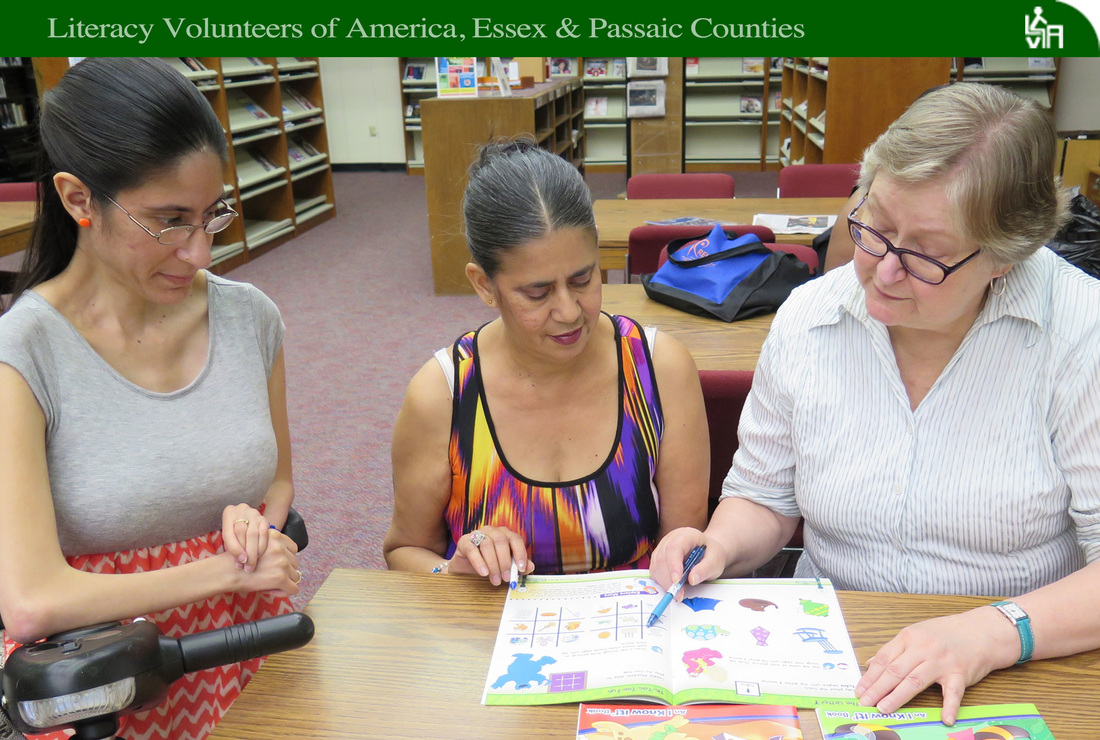Students' Success Stories 2016-17
We all enjoy success stories. They are positive messages about overcoming obstacles, working hard for the reward, and finding satisfaction in completing challenges. Read about the students who have obtained citizenship, those who escaped war torn countries and now have assimilated into American society and absorbed our culture, and those who finally read a bedtime story to a young child or grandchild. That last achievement has a special significance for a Basic Literacy student after a lifetime of frustration and low self-esteem. Here at Literacy Volunteers of America we like to celebrate all those positive events in our students’ lives. Sometimes we celebrate with hugs and treats, but most often, we share these achievements with others through this page on our website. That way all of our LVA community can share in the celebration of their success!
Jouseth
The vivid photos and stories of humanitarian work in Africa shared by a group of returning Catholic missionaries was enough to set Jouseth on her career path. “Josie,” as she is known by friends, was still an impressionable Quito, Ecuador teen devoted to helping others, when she opted to become a doctor. “Helping people was my desire. I was in Catholic school and they talked about missionaries going around the world and reaching out to others. I thought I could do my part by becoming a doctor,” Josie said.
But first she had to complete eight years at Central University of Ecuador Medical School, and all of its grueling demands, from which only 17-percent of her class would make it to graduation. There were exhausting nights the medical student spent in the Neo Natal Infant Care Unit (NICU) of a children’s hospital, where she was responsible for drawing blood from and performing spinal taps on 25 children in her care. “I never slept when I was in that department. I had to take blood from my little patients with tiny arms. They are hooked up to lots of machines and you have to be very careful not to move anything. Every morning we had to report our results to the doctors,” Josie remembered. Josie’s best experience was in her 6th and 7th year as a student in the oncology department. “The oncology department has a lot of sadness and frustration,” Josie explained, as she clearly grew animated. “In that place, you form a short term family with the children’s parents. You have to give a lot of hugs and always try to be happy.” She graduated, specializing in pediatric oncology, and spent a year working in several departments of a Quito hospital. A recession in Ecuador eventually led Josie to the U.S. She is an advanced ESOL student and one of many professionals who study vigorously with Literacy Volunteers of America in preparation to resume the careers they enjoyed at home. While she studies for her medical exams, Josie works as a writer for a newspaper and a companion for an older woman. She’s married to a man whom she met in med school. Together, they are raising two children, a 15-year-old boy and a girl, age 12. “This is a challenge,” she said. “I have to organize studying, my family, the job. I have to do it. I have faith that I am going to pass the test. Nothing is impossible,” Josie stated. |
Damian
Damian Wilson is rapidly checking off her list of personal goals. Reading and writing are at the forefront. Most recently, she entered New Jersey Association of Lifelong Learning’s Adult Learner Writing Contest and one of her selections was chosen to be showcased in their yearly publication.
At one time, this was a far off dream for Damian, but with her determination and the support of her tutor, Margaret Valentine, Damian’s dream became a reality. They meet twice a week for two hours each day and every moment is action packed. Damian said, “I am hungry to learn.” And, Margaret is eager to teach. Damian lived in Jamaica until she was a young teen, and was pushed along the school system through the 8th grade. “I didn’t grasp anything at all, but they let me go through,” she said. Not to be idle, instead Damian enrolled in a trade school where she learned to sew, cook, and babysit. She left her home country at age 14 and moved to New Jersey where she lived with one of her aunts. She took a job as a babysitter, still not knowing how to read and write. When her nephew was born, Damian had a revelation. “That is when I said, ‘Ok, I need to do something about myself. ”’ She started with evening classes but didn’t get the help she needed. “Hungry to learn,” as she described herself, Damian kept asking questions and found out about Literacy Volunteers of America. She said, “OK, this is what I want. Thank God I found your organization. I am on the journey now.” Her persistence as a learner has served Damian well as she currently works for the Board of Education at Glen Ridge. She assists pre-k and kindergarten students in their aftercare program. Damian exclaimed, “My job is awesome! I get to do projects, crafts, read, and help with homework.” With her endless enthusiasm and tireless energy, one would never imagine Damian has overcome monumental health issues. “I had a kidney problem,” she said, “but did not let it hold me back. I scheduled my dialysis so it did not affect my classes.” After a long wait, Damian’s name finally came up on the transplant list and soon she was in surgery. Damian said in her matter of fact way, “I got a kidney transplant and am back in class again. I wasn’t going to let my sickness define me.” Add a big check mark to her list of goals. |
Kathy and Geneiva
Kathy and Geneiva Carter are a class act. In fact, they are a class sister act. These two ladies have been studying English for two years with their LVA tutor, Patricia, and the three have become an inseparable trio.
Being raised in New Jersey by an illiterate mother, Kathy and Geneiva knew they wanted a better life for themselves and their children. “I needed help in my reading. I would like to improve it, “ Geneiva said. “I just wanted to enhance my comprehension skills and reading ability,” Kathy added. Before the ladies started with Patricia, they were not reading books at all. Both were products of a failing inner city educational system. The first thing their tutor did was to help them get a library card. Recalling this experience brought big smiles to their faces. “Reading is power,” Kathy said. “Knowledge is power,” Geneiva added. “We have improved a lot,” they both nodded in agreement. Church is a big part of Kathy’s and Geneiva’s lives and they enjoy reading spiritual and devotional books. “I like to read books by Joel Osteen and Joyce Meyer,” Geneiva said. “I find myself reading much better when someone is helping me to sound out the words. Every once in a while I give myself a challenge and also try to read short stories,” Kathy said. Along with church, family is of equal importance to Kathy and Geneiva. They have always lived close to each other and now are happy that they both live in the same building. They enjoy telling stories of family meals together. Geneiva’s specialty is spaghetti with Italian sausage, and Kathy’s favorite cuisine is collard greens, macaroni and cheese and turkey wings. “One time I made a ham for Christmas,” Kathy said. Geneiva quickly added, “It wasn’t very good.” They both laughed. Kathy has an addition to her family that she also likes to cook for, her 3 ½ year old grandson. “I like to spoil Javel, she said. I like to make cookies and do all of that grandma stuff.” Inspired by their children, Kathy and Geneiva want to further their education. “I want to better myself for my grandbaby and help him with school. I want to be there in any kind of way,” Kathy said. Geneiva plans to go back to school and get her high school diploma. |
Bi Lin
If it’s worth having, it’s worth waiting for and no one knows that better than Lily, an LVA student from China who waited two years for help with English. That was five years ago. Since then, she’s crossed off every goal on her to do list and developed a wonderful working relationship with her tutor, a trainer whose mother was never taught to read and write because she was a woman.
Lily came to the United States nine years ago with her husband and her daughter. When asked how she felt about the drastic cultural change from Shanghai to a quiet suburb in New Jersey, Lily said, “I like it here because I have peace of mind.” Also, Lily is living the American dream. Shortly after relocating, she started her own business. Lily has an in home studio where she teaches private piano lessons. Currently she has a roster of 15 students ages 5-12. She teaches the music of Beethoven, Chopin, and Liszt. Her students perform in recitals twice a year. Lily’s love of the arts began in China when she was a child. Her much loved nanny liked singing and took Lily to shows as a toddler. “I danced on my nanny’s lap,” Lily remembers. As a school aged child, Lily attended formal dance classes where she was trained in classical ballet as well as Chinese traditional dancing. Her repertoire also includes folk dances from India. Lily’s passion for movement did not stop as a child. As the mother of a grown daughter, Lily still practices dancing to keep in shape. She also walks at least four times a week for at least one to two hours. In her spare time, she finds opportunities to swim and play tennis. “I like to keep my body flexible,” Lily said. Lily’s commitment to her health does not stop with exercise. Actually, it was Lily’s LVA tutor who also guided her toward healthy eating. Lily loves cooking as well. “My family is vegetarian and we became vegan about three years ago,” she said. A typical breakfast in her home consists of oatmeal with soy milk. “My favorite food is salad,” Lily added. “We change our salads according to what is in season. Winter salads include cooked root vegetables. In winter, we do not eat cold food.” Dinner is often a sumptuous meal of cooked Chinese vegetables, tofu and rice. Despite her busy schedule, Lily’s commitment to learning English remains strong. Lily started with LVA as an ESL student and in only a few short years worked her way up to a Basic Literacy student and is being tested as a native English speaker. She credits her beloved tutor to her progress. “When I first came to Mary Kao, I could not speak any English. It is as if my teacher knew what I was thinking and she helped me to find the words. And, when I speak wrong, she corrects me,” Lily said. Lily’s husband is an American and he also practices with her. When asked where she gets her inspiration to keep studying, Lily answered, “It is important for immigrants to learn English. Speaking the language shows respect to the American people. And, I love this country.” |
Esteban
LVA student Esteban Morales made his mark in the computer industry in his native country of Peru and plans to continue his legacy by writing a book in English.
Esteban left Peru with his wife and two young daughters in tow and settled in Essex County a little over a year ago. In this short time, he has joined LVA and with lots of hard work and extreme dedication has become our most advanced speaking ESL student. LVA Executive Director Cristhian Barcelos said, “We are proud of Esteban and he is ready for greater and better things.” Esteban grew up in Lima, Peru’s capital city. A self- described “homebody,” he was fascinated by computers at a young age. “Someone brought a computer from the U.S. in the early 1980’s. It was a very big, sophisticated computer and that is when I became interested,” Esteban said. In his early teens, he worked with a friend during school vacations as a computer game salesman. “We didn’t sell any games, he remembered,“ but we did meet a lot of top people in the video game industry.” After high school, it was his connections that moved him toward his future career. Esteban attended Tecsup, a technical college in Lima where he studied computer programming. “My first job out of school was working at a multi-vacation company selling vacations around the world. He laughed and said, “I never got to take any of the vacations.” After a three-year stint, he took a job at the Nutritional Research Institute as head of the computer department. In the not too distant past, Esteban began programming something else: the mind. He took classes in hypnosis and Neuro Linguistic Programming (NLP). According to on line sources, the basic premise of NLP is that the words we use reflect an inner, subconscious perception of our problems. If these words and perceptions are inaccurate, as long as we continue to use them and to think of them, the underlying problem will persist. In other words, our attitudes are, in a sense, a self-fulfilling prophecy. Esteban added, “Every thought is an interpretation of an experience. We can go back and change that experience by changing the thoughts we have about it.” Esteban is currently writing a book on this subject. He sees this as a way of reaching many people at one time. If he makes the strides in his writing that he has in speaking, look for his name on the best-seller list in a few years. |
Nelly
It’s often the first encounters in a new country that leave a lasting impression on recent immigrants. And they are not always positive.
In the case of Luz Nelly, who was raised on a coffee farm in Neiva, Colombia and arrived in the U.S. three years ago, the toughest of those encounters took place in local stores. It was there that her attempts to communicate with merchants in English, using a thick foreign accent, turned simple purchases into difficult, even traumatic transactions. “They would speak to you with an attitude and say, ‘Speak English!’” she said. “You feel like garbage sometimes. It was very difficult for me. But you try not to feel resentment. I would read my Bible, pray, and ask ‘God, please help me to speak English.” Luz Nelly said she tried to remain positive following those verbal confrontations and not let them influence her one way or another. But one thing was clear, she said: Her English needed to improve. “My husband saw a flyer for Literacy Volunteers of America in a local library,” Luz Nelly said. So last summer, she enrolled in a beginning-level ESL class offered by LVA at the Montclair Public Library - Bellevue Avenue Library branch. But her academic plans were delayed when, unable to find child care for her 9-year-old daughter and not permitted to bring her to class, Luz Nelly was forced to leave the program just four days later. “But she didn’t let that discourage her,” said Maureen Cooper, who teaches Luz Nelly’s ESL class at the Montclair Public Library. “She worked out of the book at home and came back in October stronger. She’s always the first to raise her hand to answer a question.” Luz Nelly completed the 10 week ESL course in early December, emerging as something of a class leader, her teacher said. “I returned,” Luz explained, with a grin. “Even the times I didn’t come to class I took my book home and studied.” She is now slated to continue her language studies with LVA in a small group of ESL students. In all she’ll put in 16 hours of class time each month. In addition to her classes, Luz has studied with her primary LVA tutor Sally Fillmore for 15 months, 2 hours per week. “During that time,” said Sally, “Luz has been studying ESL at Essex County Community College and at her church on Saturday mornings. We often use the books from her classes at the Montclair Library to enhance our lessons. Also she has been studying for the citizenship exam and has memorized all 100 questions and answers. We are working on written work now for that test.” With all of the hard work Luz is doing, it is a given that she will pass. “My first goal was to participate in my daughter’s education,” said Luz Nelly, speaking of her youngest daughter. She has another daughter who is 24. “I want to participate fully in the life in this country,” she added. "First I want to pass the citizenship test. I plan to take that in the next few months. Then I want to pass the GED exam and study nursing.” |
Kenny
Nearly two million highly-skilled immigrants with college degrees earned overseas are either unemployed or working jobs that make little use of their knowledge and skills, according to a recent study.
It’s a group that Kenny wanted no part in. So the Passaic mother of three, a former bank worker who holds a bachelor’s degree in marketing from the Dominican Republic, abruptly quit her factory job and immersed herself in English classes and self-study. And she applied for work as a public school substitute teacher, knowing that her language skills needed to improve. “I decided to risk it because I needed work,” Kenny said. “I needed a job. I have three daughters and they need me. I worked in a factory but it was not for me. It’s just a little money and a lot of time away from my daughters.” It was a gamble. With three girls, ages 13, 5 and 4, the cost of her husband’s frequent travel to the Dominican Republic where he runs a business, and fees to have her educational transcripts evaluated in the U.S., the family had expenses. It took nearly nine months but, as schools prepped to open in September, Kenny received a call from the Passaic Board of Education, where she’d applied for a job as a substitute. How soon could she start, they wanted to know. Often the biggest obstacle to employment for recent immigrants is English, according to Immigrant Professional Integration, or IMPRINT, a coalition of organizations active in the field of skilled immigrant integration. “Across the board, stronger English language skills were correlated with virtually every possible measure of immigrant economic success,” IMPRINT said in a recent study. Kenny questioned her own English skills, even after attending LVA-sponsored ESL classes at Berkeley College in Newark and the Passaic Public Library, and plenty of self-study. “I don’t speak English perfectly but I decided to risk it,” Kenny said during an interview at the Passaic Public Library, where she attends an intermediate-level ESL class. “I decided to trust in me. I trust in the things I learned here.” She now averages four days per week in Passaic schools, working as a substitute or assistant teacher in Pre-K, Kindergarten, and 1st grade classes. So far it’s a win-win, for her girls with whom she has plenty of time to spend, and the young students who run up and hug her in the hallways. And it’s reinforced her confidence in her developing language skills. “Maybe I don’t have a lot of vocabulary but I know I learned a lot here,” she said. “And I only started to study in the program since April. I’m very, very grateful. My teachers have been excellent. The program has been wonderful for me.” |
Percy
Percy Maco is no stranger to hard work. He started laboring on his family farm in Chiclayo, Peru, when he was a youngster. He worked in the rice fields in the morning and attended school in the afternoon. “It was difficult,” Percy said. “I was supposed to just study, but when you see your family struggling, you have to help out.”
Percy’s older brother worked on the farm as well. Together, they picked and washed mangoes to truck to town and sell at the market, along with their rice. After Percy finished high school, the family left the farm and moved to Lima. They set out for a 14-hour journey by bus with only the clothes they could carry in a few small boxes. Again, without much lapse in time, Percy found work and this time was the sole supporter of his family. “I had been working since I was young, so supporting my family wasn’t difficult,” Percy said. In 2008, Percy uprooted once again to move to the United States. “Coming to the U.S. was really hard,” he said. “I left a 9-year-old son in Peru, but I wanted to leave my country to get a better job. When I came to this country, I came full of hopes and dreams for the welfare of my family.” Percy’s first job in the U.S. was washing cars during an extremely cold winter. He knew there must be something better. One day, he boarded the bus to work and on the seat next to him was an English grammar book. “I tried reading the book,” he said, “because I never knew anything about English. I only spoke Spanish. Thank God I found that book and started reading and gaining knowledge.” Percy also improved his speaking skills by watching American television. “I try to memorize how to pronounce words. I practice everyday,” he said. We met Percy at Berkeley College where he was studying English through LVA. He recently graduated from their highest level of classes. Percy has now found a steady job as a welder. His prospective boss said, “You have one week to learn. If you can do it, the job is yours.” Percy stated, “I now have the job.” He still helps out his parents in Peru and his son who is now studying computers in college. Percy is not stopping here. “I am sure I can do more things. First of all, I would like to learn more English to have a better career. That is my dream. I think I can do it,” Percy said. |
Cemal
It was the start of an exciting summer for Cemal (pronounced “Je-mal”), a Turkish language scholar and university professor from Istanbul. First he traveled to Boston for his first educational conference abroad. Then he headed to New Jersey to enroll in LVA’s intermediate ESL class at Berkeley College in Newark that started on July 5th.
Then all hell broke out back home. On July 15, a rouge faction within the Turkish military staged an attempted coup, which left about 245 people dead and more than 2,000 were wounded. The government quickly regained power and imposed a state emergency. It fired or suspended more than 100,000 civil servants, including judges, prosecutors, and teachers. Another 70,000 people were arrested, including soldiers and journalists. It’s not unusual for foreign students to be seriously affected by events at home but, even as those cases go, Cemal’s is unusual. His passport, a special document issued to educators, was declared invalid and he was ordered home. “All people who stay or live abroad have to go back,” explained Cemal, who hopes to one day teach Turkish in the U.S. “But I want to improve my English, and this was the first time I studied English abroad. It was a very important chance for my future academic life.” The scenario is also bleak for his wife, a psychologist, and their two sons, ages 17 and 11. As the spouse of an educator, Cemal’s wife had the same special issue passport as he. When she sought a new one, the police told her that her husband had not returned to Turkey after the coup and that she was suspected of trying to flee the country. “Anyone suspected of ‘escape’ is suspected of being involved in the coup,” Cemal added. “She was very upset, she was worried. She said ‘If I want to escape why would I come to the police?’ She cried and cried and cried. Every day she’s afraid.” Midway through Turkey’s state of emergency, Cemal remains in the U.S. He continues to study English but is unsure of his next move. His wife refuses to leave their Istanbul apartment and finds little feeling of safety there. “There is a chance they will arrest her for trying to escape,” Cemal said. “She is afraid that the police will come to our apartment looking for her, looking for anything.” |
Martha
Martha was only five when she lost her mother to a grueling struggle with cancer and her childhood took on new challenges.
For one, there was no permanent place to call home as she shifted from one relative’s place to another in her native central Ecuador. And attending school was nearly impossible since she was always on the move. “My life in my country was really hard,” she said. Eventually, she was sent to live with an aunt, a pharmacist in Guayaquil, Ecuador’s largest city about 100 miles away. It was yet another address change, a major one, but Martha was delighted. “I could go to school,” she said. She also worked, sometimes more than she wanted as a schoolgirl. From a young age, she put in long hours working after school in her aunt’s pharmacy. Nearly four decades later Martha is still studying and working. From July to September, she attended an intermediate English as a Second Language class at Berkeley College, a four-night per week class run jointly by the college and LVA. One of her goals is to become fluent enough to attend the nursing program at Essex County College, much like she did at a university in Ecuador. By most accounts, she’s made solid progress at the Berkeley ESL class. “It’s never too late to learn a new language,” she said. Martha said she’s dreamed of coming to the United States since she was five years old. When she eventually did, 15 years ago, the transition wasn’t the easiest. But she had help. “My cousin was able to put together money for me to buy my ticket,” she said. “I arrived with $50.00 in my pocket, and fortunately had a place to live.” Soon after her arrival in the states, Martha met a man who was from Riobamba, her city in Ecuador. They eventually married. “I can say it was destiny,” she said. “For me it is a miracle. My husband is my angel.” Martha’s husband is a cook who works seven days per week. On school days he rushes home to care for their two sons, ages seven and 12, while Martha is still preparing sandwiches and making coffee at her job in a local restaurant. Her husband also watches the boys while she attends night classes. “He is my support,” Martha said of her husband. There’s no question, with work, raising children, and night classes, Martha’s schedule is exhausting. Martha, whose mantra since childhood has been “Anything is possible,” sees her struggles as part of achieving her dream. And she wants to make sure that the principles of hard work and achievement are passed on to her boys. “When my sons see me tired, they tell me to stay home,” Martha added. “I need to teach my sons that you have to be strong. If you start something you have to finish it.” |
Maritza
A new state rule that doubles the minimum monthly hours of English instruction for students in adult education programs will present challenges for some, for sure. Others, like Maritza relish it.
Maritza, a former child psychologist from Lima, Peru, meets with two separate LVA tutors for a total of four hours per week. She’s attended classes for eight hours each week at LVA’s program at Berkeley College in Newark. She enrolled in our English conversation group in Montclair. Maritza is a coordinator in LVA’s English-Spanish Language Exchange where Spanish-speaking students teach Spanish to tutors and tutors help them study English. And she meets weekly with an exchange member to put in an hour-and-a-half of English conversation practice. Maritza also gets to practice English as she volunteers at a local food pantry and once a week at the LVA administrative office. “I want to improve my English,” Maritza said, when asked about the dizzying schedule of classes and practice sessions. “I need to feel part of this country. I’d like to understand the people. I want to help the people. I want to succeed.” And that’s not all. It’s not unusual for Maritza to study English until 2:00 am or later, long after her classes end. “The kids are sleeping and there are no interruptions,” she said. “It’s better.” In only 9 short months since her arrival last July in the United States, Maritza has dramatically improved her English comprehension and pronunciation, including accent reduction. Future plans include passing the exams to become a licensed psychologist in New Jersey where she lives with her husband and two young daughters. Actually, Maritza’s daughters were a catalyst for to learn English. “When I arrived here from Peru, I could understand nothing. I did not know how to write or how to speak. I studied some English in my country but it was nothing like they spoke in America. There were many idioms I did not understand.” Shortly after enrolling in their new school, Maritza’s daughters were told they could not stay in that school because of their limited English. “I was unhappy with this change because I knew the adaptation would be very hard for them. I felt very frustrated because I could not speak with the teachers and I knew this was not right for my girls,” Maritza said. In her daughters’ best interest, Maritza spoke to the Board of Education and also the principal. “I can communicate better in writing and we sent lots of emails back and forth,” she explained. As a result of her efforts, Maritza’s daughters were able to stay in their original school where they have nicely adjusted and made many friends. Given all of her accomplishments, it is mind boggling to believe that Maritza has been in the United States for such a short time. “Tomorrow I will have one year in this country and I know I have improved my English, but I also know I still have a long way to go.” |
Maribel (Student) - Laura (Tutor)
For LVA student Maribel, learning is truly a family affair. Her adult daughter, Yaritza, who accompanies Maribel to her weekly lessons, was born with arthrogryposis multiplex congenita (AMC), and feels driving her mother to the Bloomfield Library and ensuring she gets to her lessons is a way of showing appreciation for all Maribel has done for her.
For some, this may seem an easy task, but it involves Maribel physically lifting Yaritza’s small frame into the driver’s seat of her specially designed car. Maribel came to LVA to learn to better communicate in English with Yaritza’s doctors. Maribel has a good understanding of the English language but has difficulty speaking English. She developed her comprehension skills by sitting with her daughter in both her graduate and undergraduate courses where Yaritza studied social work. Maribel came to the U.S. mainland from Puerto Rico when she was seven months pregnant with Yaritza. It took Maribel’s sister a year of writing letters back and forth to convince her to make the move. When Yaritza was born with AMC, she was not expected to live more than four months. “Mom dedicated herself to me,” Yaritza said. “It is my turn to give back.” During their tutoring sessions, Maribel and her tutor Laura McLean, work on role-playing situations that may occur in everyday life. Their first task, of course, was to practice calling doctors. They also practiced identifying words, and using them in sentences. Fortunately, for all, they have moved on to calling theatres to find out when a show starts and restaurants to make reservations for dinner. Life has improved for both Maribel and Yaritza since they began with Laura less than a year ago. Maribel uses her English in the United States where she works as an au pair, a skill she first learned in Puerto Rico. She remembers her early years in her country where she helped her father run his farm. They grew yams, batatas, yucca, and mangoes. Maribel arranged and collected the fees for produce deliveries. There, she also developed a love of cooking. Her favorite dishes are rice and pigeon peas and pasteles. Maribel gestured toward her daughter and said, “We enjoy cooking together.” Whether it is cooking, driving, or practicing English, Yaritza and Maribel have a very special bond. |

